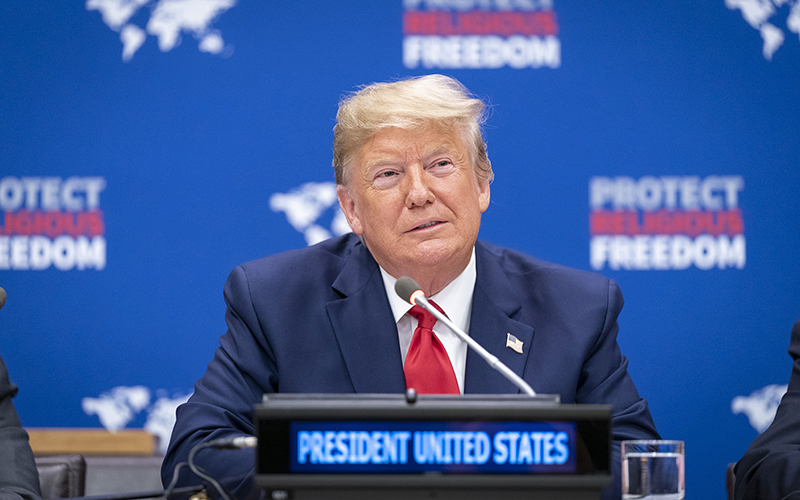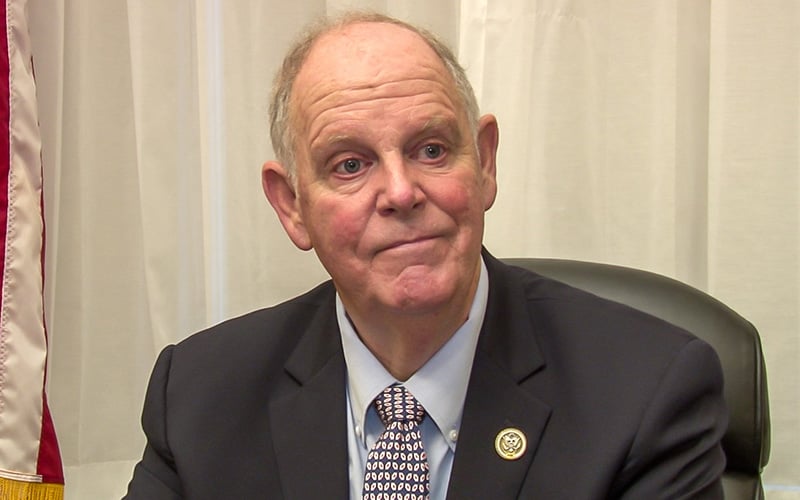
President Donald Trump said the threat of in impeachment inquiry was just another “witch hunt” of his administration by Democrats, but he did agree to release transcripts of a phone call with the Ukrainian president that has come under fire. (Photo by Shealah Craighead/White House)
WASHINGTON – Speaker Nancy Pelosi announced Tuesday that the House would open a formal impeachment inquiry on President Donald Trump, but her announcement did not appear to change any minds in the Arizona delegation.
All four House Republicans repeated their vociferous opposition to the “baseless” inquiry, while four of the state’s five House Democrats who had earlier come out in support of an impeachment inquiry said Pelosi’s announcement is long past due.
Only Rep. Tom O’Halleran, D-Sedona, has not indicated a position one way or the other. That didn’t change Tuesday, even as the number of House members who were on record supporting the inquiry rose sharply after Pelosi’s announcement.
O’Halleran’s office did release a statement Tuesday demanding that the administration release a complaint from a whistleblower who charged Trump tried to coerce the Ukrainian president into investigating former Vice President Joe Biden, a potential Trump challenger in 2020.
“We must act now to get the facts,” O’Halleran’s statement said. “If the administration does not cooperate with Congress on the investigation of a shocking abuse of power, then further action is warranted.”
It was the whistleblower’s complaint, and the fact that the director of national intelligence has so far refused to share it with Congress, that led Pelosi to say Tuesday it is time for a formal impeachment inquiry by the House, after months of investigations of administration actions.
“This week, the president has admitted to asking the president of Ukraine to take actions which would benefit him politically,” Pelosi said Tuesday. “The actions of the Trump presidency revealed dishonorable facts of the president’s betrayal of his oath of office, betrayal of national security and betrayal of the integrity of our elections.”
Trump, who said the impeachment call was just another “witch hunt” into his administration, announced earlier Tuesday that he would release the transcript of his conversation with the Ukrainian president. But Pelosi said the law requires the director of national intelligence to share whistleblower complaints with Congress and that refusing to do so is a violation of the law.
The House is scheduled to vote Wednesday on a resolution calling for release of the whistleblower complaint when the director of national intelligence testifies Thursday before the House Intelligence Committee.
Pelosi’s announcement comes after months of pressure from a growing number of Democrats who have called for impeachment, but it is just one step in the process. House Democrats still have to get the rest of Congress to agree on articles of impeachment, said Ilya Shapiro, director of the Robert A. Levy Center for Constitutional Studies at the Cato Institute.
“The investigation begins in the House Judiciary Committee, where they take whatever testimony, find whatever evidence they’re looking for, and come up with an impeachment bill, or a list of things they think are impeachable offenses,” Shapiro said.
The bill of impeachment must pass the House, with a simple majority, before heading to the Senate, where a two-thirds majority is needed to convict the president and remove him from office.

Rep. Tom O’Halleran, D-Sedona, is the only member of the Arizona congressional delegation who has not yet come out strongly for or against an impeachment inquiry into President Donald Trump. (Photo by Adrienne St. Clair/Cronkite News)
“An impeachable offense doesn’t have to be a criminal offense, and not all criminal offenses are impeachable offenses,” Shapiro said. “This is ultimately a political judgment by the majority of the House and two-thirds of the Senate whether the president has committed a high crime or misdemeanor, which can mean a lot of different things.”
Republicans were quick Tuesday to blast the call for an impeachment inquiry as a political move by Democrats.
House Minority Leader Kevin McCarthy accused Democrats of still smarting from Trump’s election, saying, “I realize 2016 did not turn out the way Speaker Pelosi wanted it to happen, but she cannot change the laws of this Congress.”
In Arizona, Rep. Debbie Lesko, R-Peoria, accused House Democrats of “using unverified claims from unknown sources” to inform the “baseless” inquiry. The rest of the state’s Republicans echoed those sentiments.
Rep. Andy Biggs, R-Gilbert, called the inquiry a “binary choice for Democrats” that requires either impeaching the president or damaging his credibility enough to hurt his odds in the next election.
“There was never a willingness to work with this president for the best of this country,” Biggs said in a statement.
But most Arizona Democrats were like Rep. Greg Stanton, D-Phoenix, who said Congress’ “failure to act would create a dangerous precedent that is too high a cost for our nation to bear.”
Rep. Raul Grijalva, D-Tucson, who was among the first House members to call for Trump’s impeachment in 2017, agreed that the House has to act.
“Trump has consistently put his personal interests ahead of those of the American people, reiterated his belief of being above the law, and obstructed important Congressional oversight investigations into the corruption plaguing his administration,” Grijalva said in a statement.
Shapiro said Democrats will have to overcome impeachment fatigue by some voters, but that action could come quickly if they can rally the votes.
“I think we’re coming to the point where it’s ‘put up or shut up,’ where either the Democrats will do this or they won’t,” he said. “A lot of the American electorate is kind of tuned out, and they have to overcome the perception that they’re not being serious about this either.”
